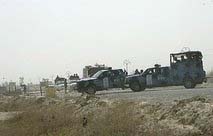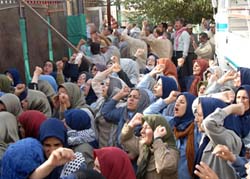BAGHDAD, July 29 — Violent clashes continued for a second day Wednesday between Iraqi troops and members of an Iranian opposition group whose camp the Iraqis stormed Tuesday, presenting the first major dilemma for the U.S. government since Iraq proclaimed its sovereignty a month ago. 
At least eight Iranians have been killed and 400 wounded since Tuesday, when hundreds of Iraqi police and soldiers in riot gear plowed into Camp Ashraf, northeast of Baghdad, using Humvees donated by the U.S. military, according to group leaders and Abdul Nasir al-Mahdawi, the governor of Diyala province…
The raid, ordered by Prime Minister Nouri al-Maliki, coincided with an unannounced visit by Defense Secretary Robert M. Gates, who left Iraq on Wednesday.
In Washington, Secretary of State Hillary Rodham Clinton described the raid as a legitimate act by a sovereign nation. "Although the U.S. government remains engaged and concerned about this issue, it is a matter for the government of Iraq to resolve in accordance with its laws," she said.
 Clinton said Iraq had given assurances that camp residents would be treated humanely and would not be relocated anywhere they would have a well-founded fear of persecution. She urged the Iraqis to "show restraint."
Clinton said Iraq had given assurances that camp residents would be treated humanely and would not be relocated anywhere they would have a well-founded fear of persecution. She urged the Iraqis to "show restraint."
U.S. officials are deeply concerned about the reports of violence and have been monitoring the situation using camera-equipped unmanned aircraft, said an official who spoke on the condition of anonymity. "We’re asking the Iraqis questions," the official said. "Sometimes they answer, sometimes they don’t."
A contingent of U.S. soldiers based outside Ashraf have been watching but have declined to intervene, residents said.
The raid and its aftermath represent a conundrum for U.S. officials. Some say they feel obligated to the MEK because its members have provided information about Iran’s nuclear program and because American officials vowed to protect them after the 2003 invasion of Iraq. But condemning this week’s events could be seen as an affront to Maliki’s government just as U.S. officials are talking up Iraq’s sovereignty, proclaimed June 30 when American troops withdrew from cities.
The stated goal of the Ashraf operation was to set up an Iraqi police station inside the camp, a move Iraq has described as the first step toward evicting the more than 3,000 residents.
Iraqi government spokesman Ali al-Dabbagh defended the raid Wednesday, telling the Associated Press that the government "intends to assert its sovereignty on all sites and facilities that were controlled by foreign troops, and Camp Ashraf is no exception."
"The Iraqi government doesn’t intend to clash with members of this camp," he said, "but it will defend the law decisively."
Tehran officials have long pressured the Baghdad government to expel the MEK, which seeks to overthrow Iran’s Islamic regime. But Iraq has held off from raiding the camp because of U.S. opposition to a violent takeover.
An Iraqi police commander who participated in the raid said the Iranians’ fierce resistance had startled the Iraqi security forces. When the Iraqis gathered outside the gate, throngs of MEK members, led by women, formed a human shield, said the official, who spoke on the condition of anonymity. "They put the women in front to prevent us from entering. They hit us with rocks and knives."
The official said 45 troops were injured. Residents at the camp said they did not provoke the forces.
After nearly four hours, the official said, the Iraqis set up a police station and checkpoints inside the camp and raised an Iraqi flag.
The State Department classifies the MEK as a terrorist organization, but Washington has interacted with the group since it agreed to disarm in 2003 in return for U.S. military protection. The Baghdad government assumed nominal control of the perimeter of the camp Jan. 1, when a U.S.-Iraqi security agreement took effect.
Special corresponden Aziz Alwan contributed to this report.
By Ernesto Londoño

